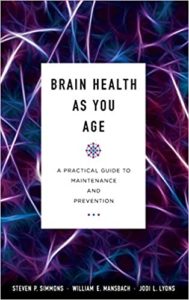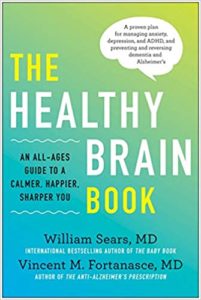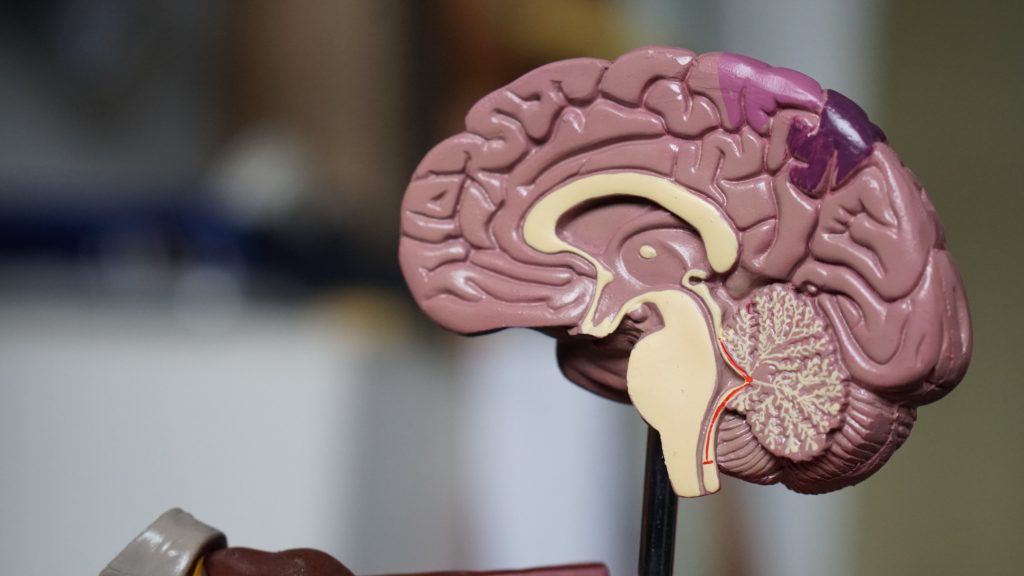You have the power to unlock your brain’s potential at any age
Disclaimer: This post contains affiliate links. Should you make a purchase, I may earn a small commission, at no additional cost to you. Know that I stand behind all the products I promote.
As we get older, cognitive health should become a priority. Brain health matters no matter your age. The choices you make today can help you have a healthier brain tomorrow.
I have been thinking a lot about brain health lately. I believe my concerns about this topic are a result of a combination of factors; the fact that I sometimes become forgetful-and, therefore, need to write down stuff more often than not-; the increasing number of articles that address the issue of brainpower or, conversely, cognitive decline, and the progressive increment of Alzheimer’s disease patients.
I sometimes become fearful of losing my sharp memory, so I started my research on this fascinating -and for many unknown-topic. This post will approach the notion of brain health. I will be providing information and advice about how to boost your brainpower. There are changes you can make in your lifestyle to keep your brain young and healthy. The content of the present piece stems from the following quote, taken from the article 6 Pillars of Brain Health, published in Healthy Brains by Cleveland Clinic:
“Lifestyle has a profound impact on your brain health. What you eat and drink, how much you exercise, how well you sleep, the way you socialize, and how you manage stress are all critically important to your brain health.”
According to this quote, many lifestyle changes might make a difference when it comes to brain health. We know that some factors affecting brain health cannot be changed: age-related changes in the brain, injuries such a stroke or traumatic brain injury, mood disorders such as depression, substance use disorder or addiction, and diseases such as Alzheimer’s disease; however, there are ways we can maximize our brain performance.
In the same way we can improve our bodies through healthy eating and physical fitness, we can increase our focus, creativity, and mental efficiency with targeted strategies and healthy brain habits. Let’s not forget that the brain is like a muscle. The more you use it, the stronger it gets. In our ever-growing quest for a healthier me, it is paramount to learn what we can do to help slow any decline in memory and lower the risk of developing Alzheimer’s disease or other dementias.
Brain Health: A practical guide for maintenance and prevention

What is brain health?
According to the Center for BrainHealth, “The touchstone of brain health is a person’s ability to function well in daily life and work. This includes making wise decisions, solving problems creatively, interacting successfully with others, and enjoying an emotional balance. Our brain changes continually in line with how we use it to think, interact, learn, feel and imagine. Our habits can contribute to or detract from the brain’s performance.”
Considering the previous definition, it is important to understand that our brains are dynamic, adaptable, flexible, trainable, and repairable.
When your brain is healthy, it has the blood flow required for peak performance. A healthy brain is essential to living a long and full life. When your brain is healthy, you can pay attention, solve problems, and communicate, among other things.
In summary, brain health refers to how well a person’s brain functions across several areas. Aspects of brain health include (information based on the article Cognitive Health and Older Adults by National Institute on Aging):
- Cognitive health. How well you think, learn, and remember.
- Motor function. How well you control movements and balance.
- Emotional function. How well you interpret and respond to emotions.
- Tactile function. How well you feel and respond to sensations of touch.
6 things you can do to boost your brain health
According to the article 3 Ways to Improve your Brain Health by Zoe Price: “Every brain is different and functions in various ways, and as we get older, it is common for our brains to change, with mental and cognitive functionality changing along with it. However, we must be always conscious of our brain health no matter how old we are and that we actively seek ways to keep our brains functioning at full potential. Just as you would encourage yourself and those around you to be healthy, it is crucial that we are equally concerned about brain health.”
Here are ways that you can improve your brain health:
- Exercise regularly.
When you exercise your muscles, you strengthen your brain. Multiple research studies show that physically active people are less likely to experience a decline in their mental function and have a lower risk of developing Alzheimer’s disease.
Exercise gets the blood flowing. That helps your brain get the oxygen and nutrients it needs for top performance.
Aim to exercise several times per week for 30-60 minutes. You can walk, swim, play tennis, or do any other moderate aerobic activity that increases your heart rate.
- Stay mentally active.
Your brain is like a muscle, you need to use it, or you lose it. Being intellectually engaged may benefit the brain. Learning something new will boost your brain. You can do many things to keep your brain in shape, such as crossword puzzles, reading, playing cards, or putting together a jigsaw puzzle. Find a new hobby, pick up an instrument, try a new language, or play chess on the computer.
- Remain socially involved.
Connecting with other people through social activities and community programs can keep your brain active and help you feel less isolated and more engaged with the world around you.
People who engage in personally meaningful and productive activities with others tend to live longer, boost their mood, and have a sense of purpose. Research shows that these activities may improve their cognitive function.
Furthermore, social interaction helps ward off depression and stress, which can contribute to memory loss. Look for opportunities to connect with loved ones, friends, and others, especially if you live alone.
There is research that links solitary confinement to brain atrophy, so remaining socially active may strengthen the health of your brain.
- Manage stress.
Stress is a natural part of life. Short-term stress can focus our thoughts and motivate us to act. However, over time, chronic stress can change the brain, affect memory, and increase the risk for Alzheimer’s disease and related dementias.
There are many things you can do to help manage stress and build the ability to bounce back from stressful situations:
- Stay physically active.
- Keep a journal.
- Try relaxation techniques such as mindfulness or meditation.
- Stay positive.
Research has found that having a positive outlook on life increases our chances of success as it can boost brain health as well as helping us to function at our full potential. Our brains become more determined by having a more positive outlook and setting ourselves high expectations and standards because we believe we can achieve them. So, ditch the negative attitude and use your brain to think positive thoughts about yourself. It’s the power of positivity.
- Rest well.
Sleep plays an important role in your brain health. Getting quality sleep energizes you, improves your mood and immune system, and may reduce buildup in the brain of an abnormal protein called beta-amyloid plaque, associated with Alzheimer’s disease.
Furthermore, there are some theories that sleep consolidates memories, which improves your overall memory and brain health.
It would be best if you tried to get seven to eight consecutive hours per night, not fragmented sleep of two-or three-hour increments. Relax, manage stress, and be happy!
Besides the six things mentioned above, diet plays a crucial role in brain health. The right food fuels your brain and gets the blood flowing.
Most people already understand that they feel better and have more energy when eating a healthy, nutritionally dense diet. However, fewer people realize that the food they eat directly affects their ability to think, learn, and commit items to memory.
Some neurologists recommend their patients to consider following a Mediterranean diet, which emphasizes plant-based foods, whole grains, fish, and healthy fats, such as olive oil. The Mediterranean diet incorporates much less red meat and salt than the typical American diet.
Omega fatty acids found in extra-virgin olive oil and other healthy fats are vital for your cells to function correctly and increases mental focus. Eat smart, think better.
Best foods for improving brain function and memory
This is a list of the best foods to boost and maintain your brain young and healthy.
- Fatty fish (omega-3 fatty acids): salmon, trout, albacore tuna, herring, and sardines.
- Blueberries. They are packed with antioxidants that may delay brain aging and improve memory.
- Nuts. Contain a host of brain-boosting nutrients, including vitamin E and healthy fats.
- Eggs. They are a rich source of B vitamins and choline, important for regulating mood and promoting proper brain function.
- Oranges. Vitamin C helps to protect the brain against age-related decline. Additionally, this vitamin is an antioxidant, which traps free radicals that would otherwise damage brain cells.
- Dark chocolate. The flavonoids in chocolate may help protect the brain. Dark chocolate containing at least 70% cocoa content could boost both memory and mood.
- Broccoli. It contains many compounds that have potent antioxidant and anti-inflammatory effects, including vitamin K.
- Pumpkin seeds. They contain a variety of substances like zinc, magnesium, copper, and iron. Zinc and copper support healthy nerve signaling, while magnesium is a key component of learning and memory. An iron deficiency contributes to the impairment of brain function.
- Cherry tomatoes. Like other red and orange fruits and vegetables, cherry tomatoes are packed with carotenoids. This nutrient, scientists believe, improves thinking and memory.
- Green tea and coffee. Coffee can help boost alertness and mood. The content of caffeine in green tea and coffee may offer some protection against Alzheimer’s. The caffeine in green tea increases brain function, and it has been found to improve performance, memory, and focus.
The Healthy Brain Book

Conclusion
Changes to your body and brain are expected as we age. However, the same way you take care of your body, you can take care of your brain for optimal life quality down the road. There are many small changes to your lifestyle that will go a long way regarding brain health.
Your brain is a big deal. As the control center of your body, it’s in charge of keeping your heart beating and lungs breathing, allowing you to move, feel and think. That’s why it’s a good idea to keep your brain in peak working condition throughout your life.
Healthy habits and the proper diet play a crucial role in keeping your brain healthy and improve specific mental tasks, such as memory and concentration.
Besides healthy habits and diet, there are other ways to improve your brain health. Click on the link below to know more.

